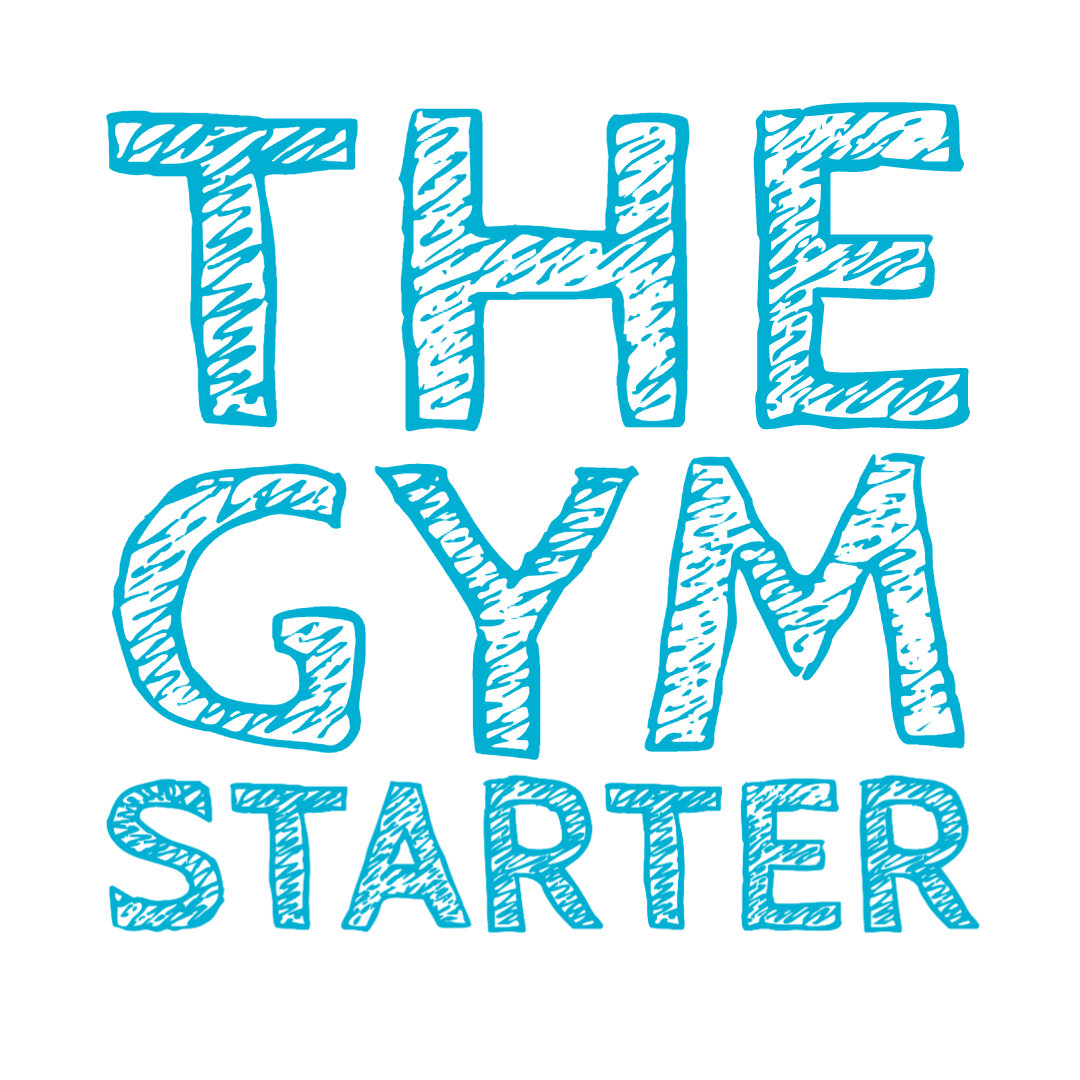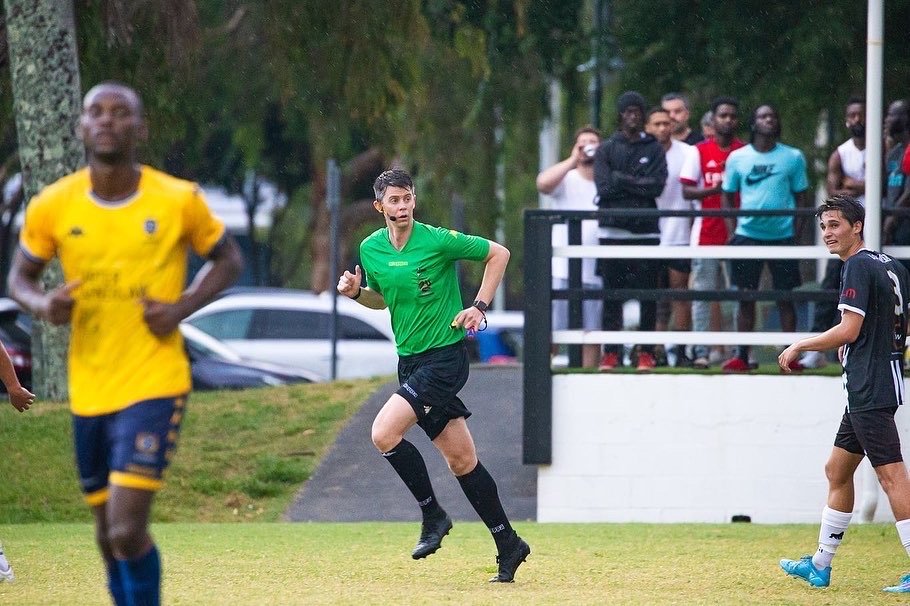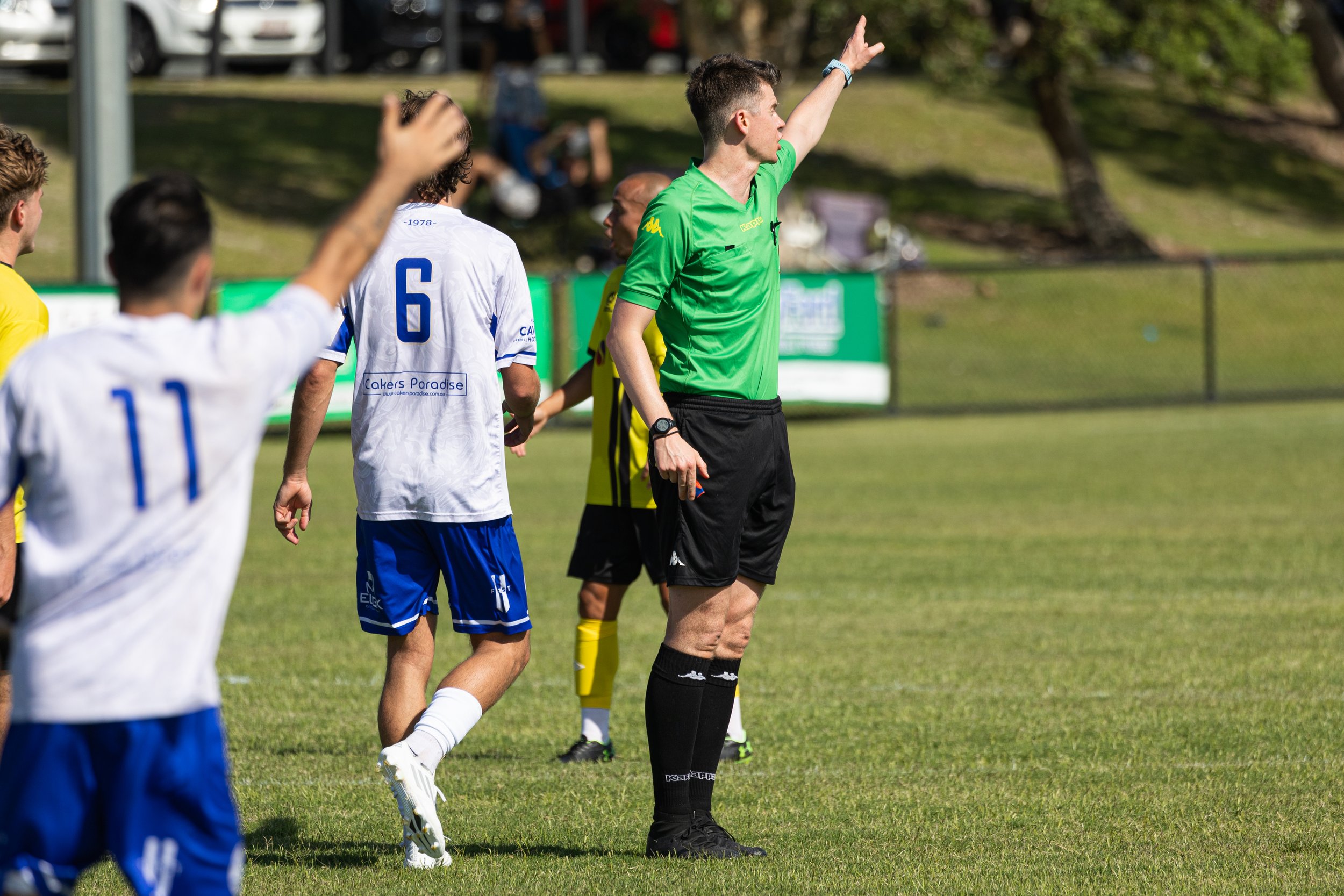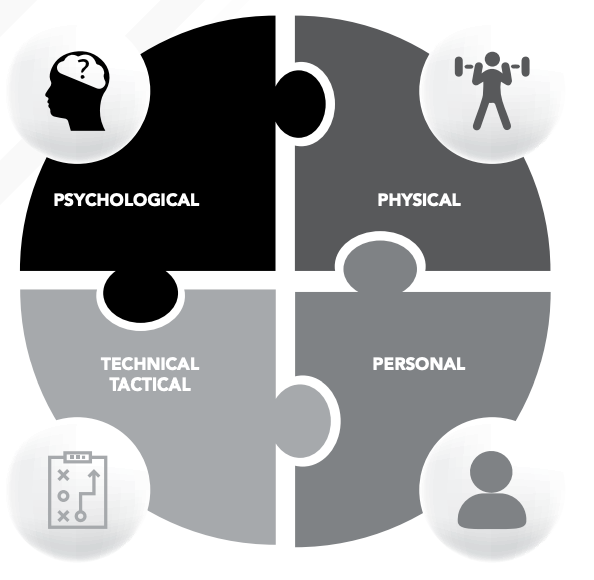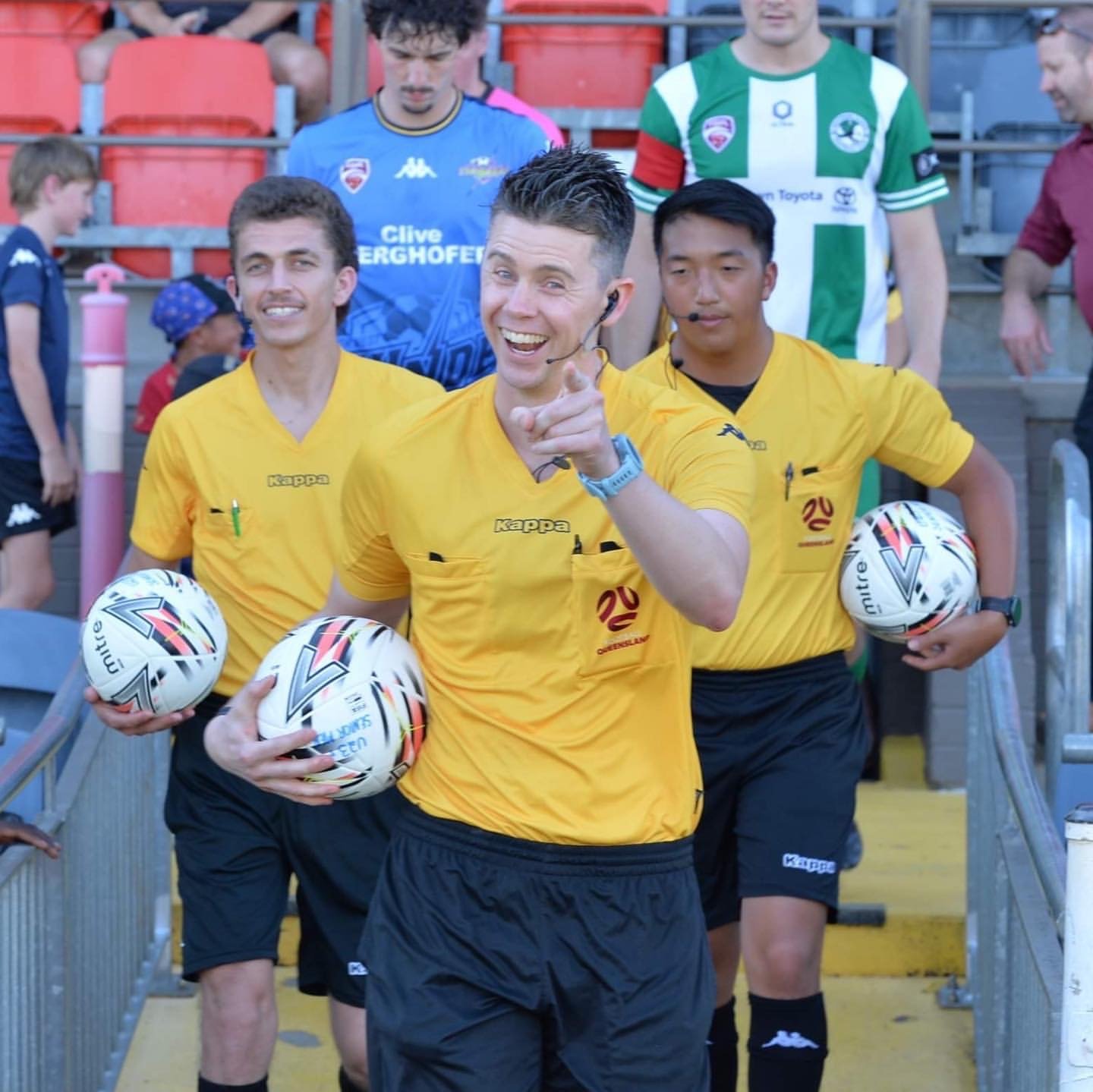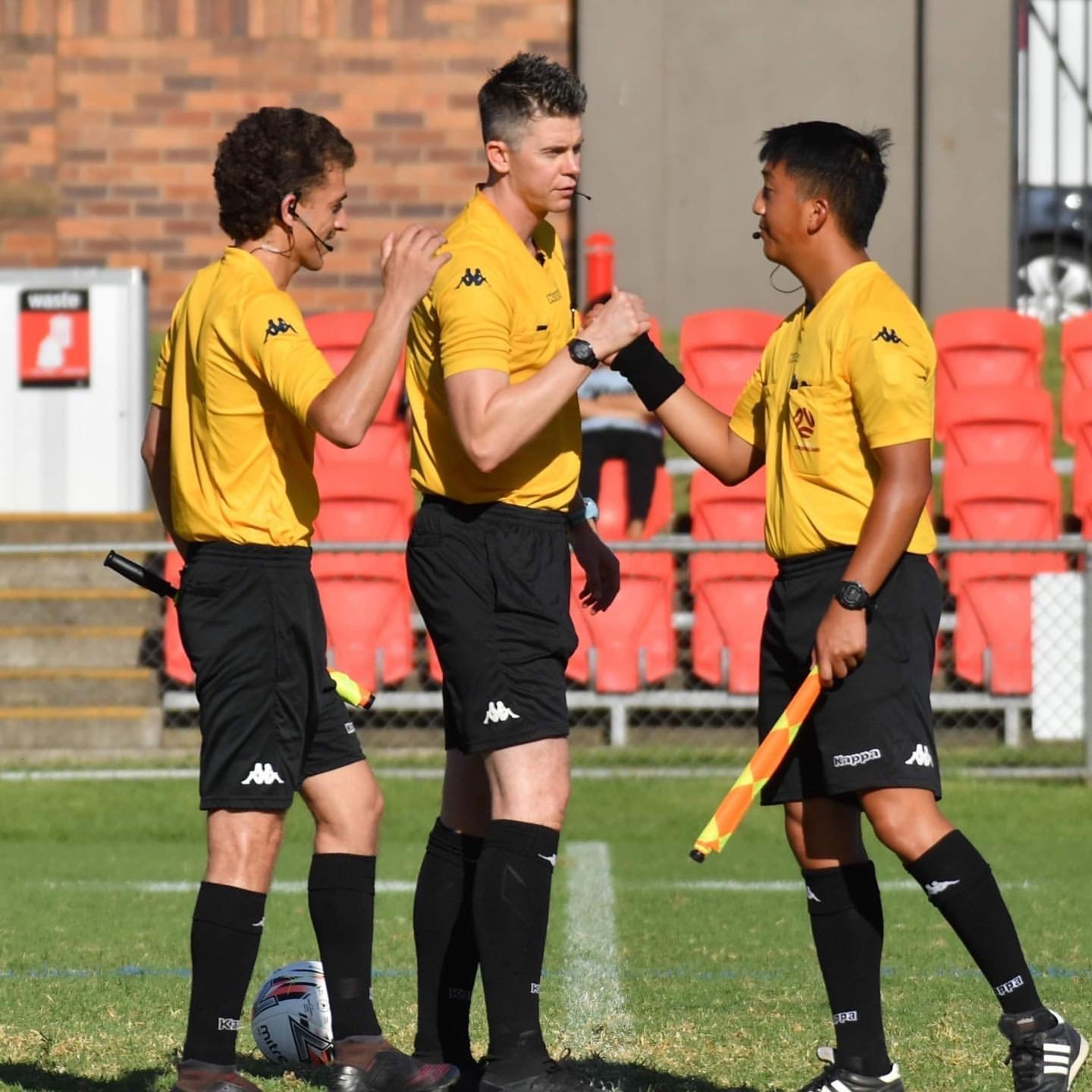A Practical Fitness Plan for Football and Soccer Referees
That’s me. Refereeing here in Queensland Australia.
This was my third game back in 2022 after a few years off. I retired from football in 2019 in the UK, my last game was a very cold, very wet, pre-Christmas game where I was very very happy to be hanging up my boots after about 8 years as a referee. I managed to get to Level 4 in the UK in the space of three years and completed 8 full seasons as a referee in the UK. I am now starting my tenth full season overall, and second in Queensland.
I had a lot planned when I retired in the UK - a move across the world being one of those things, and I just needed to claw some time back in my life to be with my family and focus on my business.
I’m telling you this for a number of reasons, but the first one is that coming back to refereeing is what inspired me to create a podcast with my good friend Ed Connell. I realised I had been out of football for a number of years, and over that time a lot of the Laws had changed - and I had no idea about them.
So I messaged Ed, and said to him that I need to re-learn the Laws of the Game. But I am a very poor reader and was constantly trying to find an audio version of the Laws. Alas, this didn’t exist - so I told Ed - lets's make it a podcast. That way I can pass my theory exams, and hopefully it will help other referees too.
So we created a podcast which you can listen to here: Red or Yellow
LISTEN TO OUR LATEST EPISODE HERE
This has now become one of the most popular podcasts on the internet in the art of refereeing, and our listeners are just the best.
They ask all kinds of questions, and we spend our time not just covering the Laws of the Game, but answering questions and coaching other referees all around the world.
And one topic that comes up time and time again is: Fitness for Refereeing.
Hence I am here. Writing this for my listeners, and for you.
I passed my latest fitness test just last Tuesday, and at the mean old age of 35, I am starting to learn lots of different things about my body and how it relates to the very strange conundrum of Fitness for Refereeing.
Referee fitness is a very different beast to many other sports - and this program is designed to help you through all aspects of that, in a practical way, that isn’t written for FIFA Referees, that takes into account your life as well as your desire to get better and better at refereeing.
I hope you enjoy it, and I hope truly that it helps your game improve - because that is what we are all after.
I am going to take you through a whole season, of football, from Pre Season to Post Season and everything in between.
Table of Contents for: A Practical Fitness Plan for Football and Soccer Referees:
What Fitness does a Referee need in Football?
The Referee Fitness Test
Pre-Season Fitness for Referees
In-Season Fitness for Referees
The Importance of Recovery
A Note on Injuries
What Fitness does a Referee need in Football?
It’s unique to say the least and it changes from level to level of what you referee. But I am going to presume that because you are here trying to find out how to improve your fitness, then you want to work to the highest level you possibly can.
A referee needs three main abilities:
A quick change of speed
Fast heart rate recovery
Cognitive fitness
Simply saying “Cardio Fitness” is a little bit of a red herring, as there is so much more demand on your system than just your heart rate - important though it is.
My goal for the 2023 season is to cover an average of 10km a game.
The Asian Football Confederation outline [1] the following demands that are placed on a Referee for their fitness:
The total distance equals 11-12km per game
High-Intensity Activity for 4-18% of the total distance
Sprinting 1-8% of the total distance
Changes of direction >500 mostly 30-60 degrees
Average Heart Rate is 85% of your MaxHR
That’s quite a demand.
Obviously, this is at a professional standard of refereeing. But it does still bring it into perspective even for the grassroots referee.
This is how the AFC sum up the fitness environment for refereeing:
I almost wanted to put the following GIF under the headline of “fitness environment for referees”:
We have a lot on our plate.
Add into that, no two games are the same, you must always prepare for the worst-case scenario.
The Asian Football Confederation also states this about refereeing:
“The majority of referees have jobs, trades or professions to earn a living. Refereeing is therefore an additional activity – a hobby of sorts in some cases. Finding a balance between the demands of work and life, family and officiating is challenging and similar to that found in amateur and most Olympic sports: schedules of training sessions, time away on refereeing duty, and so on.”
Despite all of this, there is still an expectation of perfection to our performance - and yet we are not given the same tools as professional athletes to be able to produce such results.
I have found that many plans for referees are all designed for the highest level of performance. Which of course is always the aim.
But how does that help you as a Grassroots referee? How does that help you when you have:
A family to care for?
A full-time job fit into your schedule?
No access to professional coaching and technology?
An ability to go to the gym maybe once/twice a week?
A social life to squeeze into this?
Refereeing for so many of you is a hobby. A hobby we should all strive to get better at, and keep developing with and learning from. A hobby that can turn into a professional career. But a hobby. A hobby that a lot of the programs from football bodies just aren’t balanced correctly for you to develop and balance your life.
And that is why I am here writing this for you.
Let’s start at the start of your season:
Follow The Podcast on Instagram:
The Referee Fitness Test
If you listen to Red or Yellow you will be fully aware of my struggles with Fitness Tests. I shan’t publicly shame myself here also.
I have never failed a fitness test – but I have always found them a struggle – and they are pretty demanding affairs.
I get very nervous about them, and am very aware that a lot of people see me as “the personal trainer who is a referee” – and I, therefore, feel a certain expectation is placed upon me. Rightly or wrongly.
I am also very happy to state I am not the fittest referee in the world. I do have a congenital heart condition, and that does impact my ability for high performance somewhat. But we can all have excuses, and the truth is, in spite of this, I also need to make sure I work hard enough to stay on top of my ability to pass my fitness tests each season, if I want to continue the high level I do referee at – or even improve.
In the UK my Fitness Test used to be 2600m in 12 minutes flat as a straight run.
Now it is a FIFA Level Dynamic Yo-Yo Bleep Test which I have to get a minimum of 18.5 to pass.
This means I have to cover 40 meters, sprinting, with decreasing rest and increasing speed, over roughly a 15-minute time frame.
For context, to be at the National/International Level you need to hit 18.8+. So I am performing at a pretty high level. I had my Fitness Test last Tuesday and got 18.7, and running in January, at night in Queensland, is a whole other deal.
Over the years, and the fitness tests that I have done I have found these the most helpful strategies to pass them:
1. PRACTICE THE TEST
“To fail to prepare is to prepare to fail”
You can argue that the Fitness Test for refereeing does not mirror the act of refereeing very well. You certainly get longer rest times on the field to recover your heart rate and therefore sustain your fitness over the 90 minutes of the game.
However, it is part of the process of what you have to do to referee.=
So you need to get comfortable with doing them, and fighting them will not help you.
Last year, I had no idea what the test was or how to do it. I had no clue what a dynamic yo-yo was, and it was completely new to me. I went into it, relying on pure grit, determination and a prayer – and I passed. Just.
This was because it was my first year here in Queensland refereeing, after three-four years off and it was just a different process from what I was used to.
I do not recommend this as a process.
Practice. When the fitness test is performed, you won’t be refereeing, so you have plenty of capacity to practice the test.
They are unique in their design, and therefore you can’t rest on your laurels to pass.
You can download an audio guide to the Dynamic Yo-Yo Test here: FIFA Dynamic Yo-Yo Test
Go to Kmart buy a set of cones, buy a tape measure, and practice once or twice a week, for about 8 weeks before you get tested.
If you are in the UK, then get on a treadmill and set yourself up for a 5km run. Within that 5km, make sure you cover 2600m or 27000m depending on your level within the first 12 minutes of running your 5km, then finish off your 5km at whatever pace you can manage.
Do this once or twice a week for 8 weeks building up to the test.
I would also say, try and make your practice conditions a little harder than the testing conditions.
· Set your cones 42m apart
· Practice in the heat of the day
· Try and get your 2600m done in 11:45 on the treadmill
· Practice when you are more tired than normal
· Practice at the end of your Gym session rather than at the start
These little things will make it a lot easier when you have geared your whole day to be able to complete the test and you feel at your best.
By practising your Fitness Test you will achieve two things:
1. Builds your ability to simply pass the test – sometimes you just have to pass what is in front of you.
2. Builds your confidence – this is a big thing for me. If I feel confident in my knowledge of preparation for a test, on testing day, when there is pressure on you when there are your peers near you, and nerves are jangling, you can lean into the preparation you have done and know, no matter what happens emotionally on the day, you can physically pass what you are doing.
1. DAY OF THE TEST
“Nerves are natural, it shows you are ready to face a challenge and perform”
Depending on the time of the day of your test, will depend on how you prepare for the test. But there are some principles you can adopt to help no matter what.
Sleep the night before - don’t stay up late, don’t drink alcohol, and don’t do anything that won’t give you the best chance of a good night’s sleep the night before. If I have an evening test, I also make sure I have time for a nap beforehand.
Hydration - you must make sure you are hydrated for your performance. You should be looking at about 3ltrs a day, especially on a game day, but for your test, if it is at the start of the day, have at least one litre in your system, and continue sipping as the day rolls on.
Wear the same kit you trained in - you want to replicate your training as much as possible.
Time your food - eat a main meal about 90 minutes before your test, this will give it enough time to be digested making you feel lighter when it comes to the test, but equally you will have the glycogen in your system you need.
Run your test - don’t try and keep up with someone you have never met and is a lot fitter than you. Equally don’t try and get your mate through the test if it will jeopardise your ability to pass.
Control your nerves - it’s normal to be nervous and you need to learn to work with them. Take confidence in your preparation and get comfortable with your environment, this will make the whole experience worthwhile.
Warm up on your terms - do what will make you feel best for your fitness test, don’t get dragged into a really intense warm up that you weren’t ready for.
Follow Me On Instagram:
Pre-Season Fitness For Referees
Pre Season is undoubtedly the weirdest time there is as a football referee - I am going through it right now. It’s just weird. Weird energy, weird football and above everything else, you are trying to get fit as well as the players.
There is also no real defined “pre-season” time. Every league, every club and every country has a different length of pre-season, different rules around pre-season and my goodness, the weather is very different in pre-season.
So far my games have been in 32-40 degree heat.
Unfortunately, at this point, just doing Pre Season games is unlikely to be enough for you to get fit in time for the season to begin. This all depends, obviously, on how active you are in the post-season, but, you should have used that time to relax and recuperate, as the body always needs downtime, as does the brain.
No athlete should be going at their peak 12 months of the year.
My Pre-Season Objectives are as follows:
To build strength and injury prevention work.
To develop my long-term cardiovascular ability
To keep flexible enough to enjoy the work needed to referee
Once I have my objectives in place for this part of my season, I then devise a training plan. I nearly always referee on the weekend, especially in pre-season, and therefore my plan is structured thus:
MONDAY: REST AND RECOVERY
My rest and recovery from a game usually involve going for a light swim, and continuing to walk, alongside just decompressing from my match and trying to just get the whole thing out of my system.
TUESDAY: MOBILITY EXERCISES
This can be anything related to mobility. At the minute I am very much working on my Hip Mobility to improve my agility and sprints.
WEDNESDAY: STRENGTH AND INJURY PREVENTION
I put this in the middle of the week because by the time I have recovered from my weekend, I am hoping I still have the energy with which to work out. I am only putting one Strength Training Session in here, and therefore there needs to be an element of full body work to it.
I would also suggest working to an intensity of 8 or 9 out of 10 on the RPE Scale for the workout.
The RPE Scale is known as the Rate of Perceived Exertion and is a subjective scale that will let you figure out what weights to put on the bar.
You will want to work your hardest in the gym during the preseason as there are fewer demands on your performance as a referee. This is about maximising your time to get as fit and strong as possible without the worry of competitive football.
My preferred workout is:
WARM-UP:
Mobility Work: 2 Sets, 10 Reps, RPE ~4
MAIN MOVEMENTS:
1.5 Dumbell Bench Press: 4 Sets, 8 Reps, RPE ~9
Barbell or Dumbbell Romanian Deadlift: 4 Sets, 8 Reps, RPE ~9
90 seconds rest after each Set
3 Rounds of the following SUPERSETS (do one round of all exercises before you rest):
Lateral Pull Down: 10 Reps, RPE ~8
Push Ups: 10 Reps, RPE ~8
60 secs rest after each set of Push Ups
Barbell Shoulder Press: 10 Reps on each side, RPE ~ 8
Lunge Driver: 10 Reps on each side, RPE ~8
Barbell Bent Over Row: 10 Reps, RPE ~8
60 seconds rest after each Barbell Bent Over Row
2 Rounds of the FINISHER SUPERSET:
Lateral Heiden Hops: 20 Reps, RPE ~8
1.5 Single-Leg Hip Thrust, RPE ~8
Plank Shoulder Taps: 20 Reps, RPE ~7
THURSDAY: NON-IMPACT CARDIO
Here I would just work at 80% of my Max Heart Rate for about 20-30mins.
To figure out your Max Heart Rate (MHR) you need to subtract your age from 220.
I’m 36 years old therefore my MHR is 184. 80% of that would be 147.2 beats per min.
Another way of figuring this out would be an RPE ~8 out of 10.
This could be executed on a walk, a swim, a bike ride…anything that is Cardiovascular work but not running.
FRIDAY: REST AND RECOVERY
This is pretty straightforward. It doesn’t mean go out and party, it simply means give your body some time away from the demands of moving under stress.
SATURDAY/SUNDAY: MATCH DAY & LIGHT MOVEMENT WORK
Depending on what day is my game, will depend on what I do on the other day. My light movement work would likely be:
Walking
Swimming
Mobility
A 60% of MHR Jog
I wouldn’t associate any performance goals or expectations to the movement, I would just make sure I am moving to keep my energy up and to help me sleep well the night before my game.
That is the Pre-Season plan I would stick to. Obviously, you might need to keep it flexible to work around your life, but if you have the structure, you can then group days together or make it match your life in the best way possible for you.
What I would say is that you likely know where your strengths and weaknesses lie. If you feel you need to do two strength sessions a week then feel free to substitute one in. Now you have a structure you can manipulate it to your needs and desires - and that is important as you know your body best.
In-Season Fitness For Referees
Once the season starts, life can get very hectic for your fitness for four main reasons:
Travel demands will likely increase
Mid-Week Fixtures come into the fray
Games will be more demanding
Sleep will likely be impacted negatively.
A lot of what goes into your fitness during a season is more to do with recovering properly compared to working on your ability to perform.
And the more games you do each week, the more your focus needs to be on solely recovering rather than just performance.
If I am having one match a week my plan would look like this:
MONDAY: STRENGTH AND INJURY PREVENTION WORK
During the season my workout would have a slightly more upper-body focus compared to my pre-season training, as I would want to preserve energy and my ability to recover my legs for my performances and cardio work.
Now you are in the season, you want to drop the intensity of your workouts in order to allow for optimal performance and recovery from physical exertion.
My workout would look like this:
WARM-UP and HIP MOBILITY EXERCISES:
MAIN MOVEMENTS:
Barbell Squat - 3 sets, 10 reps, RPE ~7
Pull Up - 3 sets, 10 reps, RPE ~7
90 seconds rest between each set
3 Rounds of the following SUPERSET:
Single Arm Dumbbell Row: 10 reps on each side, RPE ~7
Barbell Hip Thrust: 10 Reps, RPE ~7
Incline Dumbbell Chest Press: 10 reps, RPE ~7
3 Rounds of the following SUPERSET:
Barbell Romanian Deadlift; 10 reps, RPE ~6
Russian Twists: 15 reps on each side, RPE ~6
Walkout: 10 reps, RPE ~6
Bird Dog: 8 reps on each side RPE ~6
60 seconds rest after the Bird Dogs
TUESDAY: CARDIO AND FLEXIBILITY WORK
This is going to be designed to give you enough time to recover in time for your game at the weekend, as well as put in enough work to feel the progress you are after.
In this session, you need to make your Cardio Session an RPE of 8 or work to 80% of your MHR and I would expect to see a 20-30-minute session here.
This can be:
Running
Cycling
Rowing
Swimming
And then your cool-down period is the Hip Mobility stretches below.
WEDNESDAY: REST AND RECOVERY
Just take a day off of physical work and enjoy yourself.
THURSDAY: CHANGE OF DIRECTION WORK ~10-20mins
There are many exercises you can do for a change of direction work, and they are all designed to help improve your agility and your ability to get around the field.
Remember a referee has to >500 changes of direction in a match. We need supple ankles, knees and hips.
Within this program, I have tried to encourage Hip mobility the most, as oftenn in sports therapy when there is an issue with a tight ankle or knee, the hip is the starting place to help recover that.
Change of direction drills can be:
Lateral Hurdle Hops
Lateral Broad Jump
Lateral Single Leg Cone Hops
Lateral A Run
Bosu Single-Leg Hops
Back and forth progressive sprinting
RPE for the whole session is ~7.
FRIDAY: REST AND RELAX
Use Friday to recover from your week, and prepare yourself mentally and physically for your game. If you haven’t already; text your team to check in for the day ahead, lay out expectations and find out what they want from the game as well.
SATURDAY/SUNDAY: MATCH DAY & LIGHT MOVEMENT WORK
This is very much the same as in Pre-Season, do what you need to get yourself ready for the game ahead.
The Importance of Recovery
The most important thing I want you to remember here is the following:
“Rest is your fuel for the future”
You must take your rest and recovery seriously in your season. The purpose of rest and recovery is to make sure that you get yourself physically able to perform at your highest level as quickly as possible.
As I have gotten older, this is becoming more and more a key feature of my week.
If I recover correctly, it means I can keep on top of my training schedule, which makes me a better referee overall.
Recovery can be broken into two key features:
Sleep
Active Recovery
Sleep is critically important for the body to be able to recover, and to make sure that you don’t start fatiguing faster than you should be. The more active you are, the more importance you must put upon your sleep.
Some important things for you to put into practice with your sleep would be:
No caffeine past midday
Go to bed at the same time each day
Wake up at the same time each day
Reduce alcohol intake
Make sure your room is as dark as possible
Only use your bedroom for sex and sleep
These are all very important to make sure you are getting into deep REM sleep. Alcohol and caffeine block your body’s ability to get into the more restful sleep cycle, as does light infiltration and blue light from televisions and screens.
Obviously, there is a balance to be struck with all things, but by outlining what the expectation should be you can see areas of your recovery to work on.
Added to this, deeper stronger sleep makes you more resilient, helps you perform more physically, and will help you not fixate and stress out over decisions you made in the game. You need time away from football not just physically but mentally as well - and the better you sleep the better your mental state for each game will be.
Active Recovery will look different for all of us. So what I will do is outline the recovery process I use and you can then adopt and adapt it for your needs.
GAME DAY
On the game day my post-match recovery starts the second I wake up. I put a big emphasis on being hydrated and I make sure I take my daily magnesium supplement.
About three hours before my game I will put on compression tights and wear them to the game.
In the changing room, I will stretch and foam roll, alongside my warm-up with my assistants for the game.
Post Game I will put on my compression tights again and wear them until bed and have a protein shake with creatine monohydrate in it.
Then I will do everything I can to make sure I get a great night's sleep.
GAME DAY +1
The next day is a really cold bath in the morning for at least 10mins with magnesium salts in it.
Followed by 20mins on the foam roller or a light swim.
Depending on how tight I am I might have some time on the massage gun as well.
Again, I am keeping my nutrition well-balanced, and my hydration high.
I also get a remedial massage once a month, and if I have any further issues I might go more frequently.
A Note on Injuries
I have had three major injuries. in my decade as a referee. The first was a pulled tibialis anterior, which occurred at the same time I was training for the London Marathon.
The other two were last season. I wasn’t entirely sure what happened in the first instance, but I can only describe it as my Glutes, Lower Back and Hamstrings lit up like a Christmas Tree and. running seemed to not help at all.
The other was a pulled calf muscle and I have had to be very careful about my calves ever since.
I say this for two reasons:
The first is that injuries are a natural part of being athletic, and trying to perform physically. You won’t get into too much trouble with them if you listen to your body, don’t push through the pain and make sure you seek the right help to rehab yourself properly.
If you do push through pain, don’t seek advice, and try to carry on, you are more than likely to make the problem much much worse.
For most muscular injuries a good way to look after them is the following RICE acronym:
Rest
Ice
Compression
Elevation
The other thing I would like to say is that injuries are a sign of two things:
Too much load
A weak body to cope with the load
If you are finding joint and muscular issues a regular theme in your fitness, then you are likely lacking in strength and flexibility and you are doing too many matches for your ability.
The good news is that your ability can change if you get your training. in place and build your muscular strength.
Yes as referees we need endurance and the ability to run. But if you aren’t strong enough to run, then you can have the greatest cardio in the world, but if every time you go running you break down, that cardio is being put to waste.
There is a great deal of balance to be struck with all runners between strength and cardio, and as referees the more strength you build the more you can improve your cardio as you will be able to put a lot more into your running as well.
I think only having three non-chronic injuries in a decade of high-level officiating is a testament to the balance I put into my training program.
The balance I have tried to outline here for you to grow and learn from as well.
I’m 36 and still improving. That likely means you can as well.
A Final Word…
I truly hope you found this article useful, and that there are plenty of things in here you can take into your season.
If you need help with anything in relation to your fitness then please send me a friend request, by filling out the form below. Since starting Red or Yellow I have loved connecting with other referees all over the world, and helping them has bought me so much joy. When you send me a friend request I will send you free workout manuals and nutrition guides to help you even further with your fitness.
If you would like any other advice right now to help you with your fitness then I can recommend this further reading:
I truly wish you all the best with your refereeing and of course your fitness.
Good luck for your season.
Thank you so much for being here.
Coach Adam
References:
AFC refereeing guidelines - footballfedtas.com.au (no date). Available at: https://footballfedtas.com.au/wp-content/uploads/2022/02/afc-refereeing-fitness-training-guidelines.pdf (Accessed: January 25, 2023).
